英语翻译与写作-Diction
- 格式:doc
- 大小:59.00 KB
- 文档页数:4
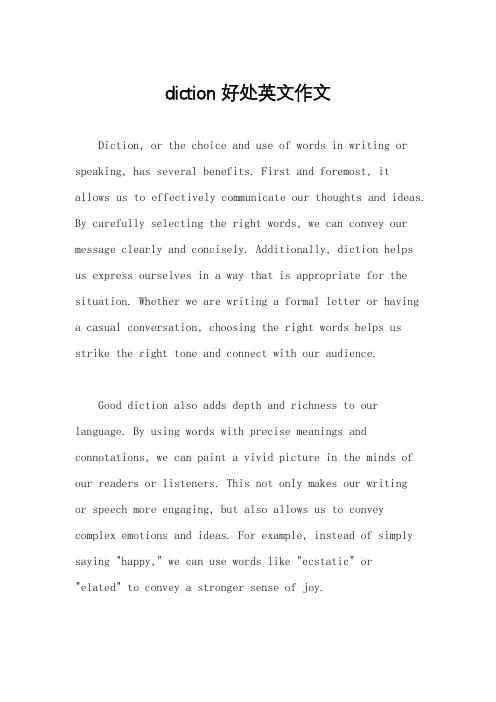
diction好处英文作文Diction, or the choice and use of words in writing or speaking, has several benefits. First and foremost, it allows us to effectively communicate our thoughts and ideas. By carefully selecting the right words, we can convey our message clearly and concisely. Additionally, diction helps us express ourselves in a way that is appropriate for the situation. Whether we are writing a formal letter or having a casual conversation, choosing the right words helps us strike the right tone and connect with our audience.Good diction also adds depth and richness to our language. By using words with precise meanings and connotations, we can paint a vivid picture in the minds of our readers or listeners. This not only makes our writingor speech more engaging, but also allows us to convey complex emotions and ideas. For example, instead of simply saying "happy," we can use words like "ecstatic" or "elated" to convey a stronger sense of joy.Furthermore, diction plays a crucial role in establishing credibility and professionalism. When we use appropriate and accurate language, we demonstrate our knowledge and expertise on a particular subject. This is especially important in academic or professional settings, where precision and accuracy are highly valued. By using the right words, we can effectively communicate our expertise and gain the trust and respect of our audience.In addition, diction can help us connect with different cultures and communities. By using inclusive and culturally sensitive language, we can show respect and understanding towards others. This is particularly important in a globalized world, where we often interact with people from diverse backgrounds. By choosing our words carefully, we can bridge cultural gaps and foster better communication and understanding.Lastly, good diction enhances our overall writing and speaking skills. By paying attention to the words we use, we become more aware of the nuances and subtleties of language. This not only improves our vocabulary, but alsohelps us become more articulate and persuasive communicators. With practice, we can develop a strong command of diction, allowing us to express ourselves with clarity and precision.In conclusion, diction is essential for effective communication. It allows us to convey our thoughts and ideas clearly, adds richness to our language, establishes credibility, fosters cultural understanding, and enhances our overall communication skills. By choosing the right words, we can connect with our audience, express ourselves effectively, and make a lasting impact.。
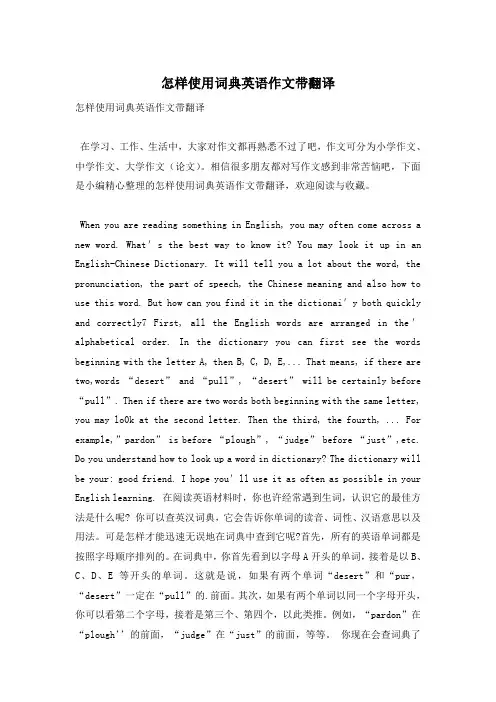
怎样使用词典英语作文带翻译怎样使用词典英语作文带翻译在学习、工作、生活中,大家对作文都再熟悉不过了吧,作文可分为小学作文、中学作文、大学作文(论文)。
相信很多朋友都对写作文感到非常苦恼吧,下面是小编精心整理的怎样使用词典英语作文带翻译,欢迎阅读与收藏。
When you are reading something in English, you may often come across a new word. What's the best way to know it? You may look it up in an English-Chinese Dictionary. It will tell you a lot about the word, the pronunciation, the part of speech, the Chinese meaning and also how to use this word. But how can you find it in the dictionai'y both quickly and correctly7 First, all the English words are arranged in the'alphabetical order. In the dictionary you can first see the words beginning with the letter A, then B, C, D, E,... That means, if there are two,words “desert” and “pull”, “desert” will be certainly before “pull”. Then if there are two words both beginning with the same letter, you may lo0k at the second letter. Then the third, the fourth, ... For example,”pardon”is before “plough”, “judge”before “just”,etc. Do you understand how to look up a word in dictionary? The dictionary will be your: good friend. I hope you'll use it as often as possible in your English learning. 在阅读英语材料时,你也许经常遇到生词,认识它的最佳方法是什么呢? 你可以查英汉词典,它会告诉你单词的读音、词性、汉语意思以及用法。
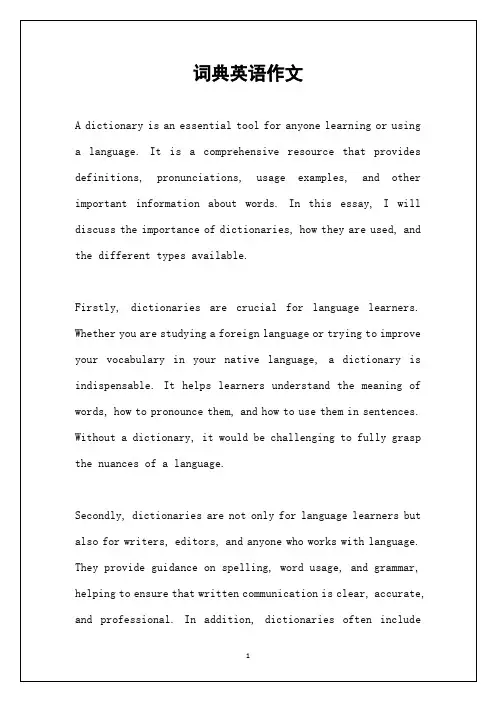
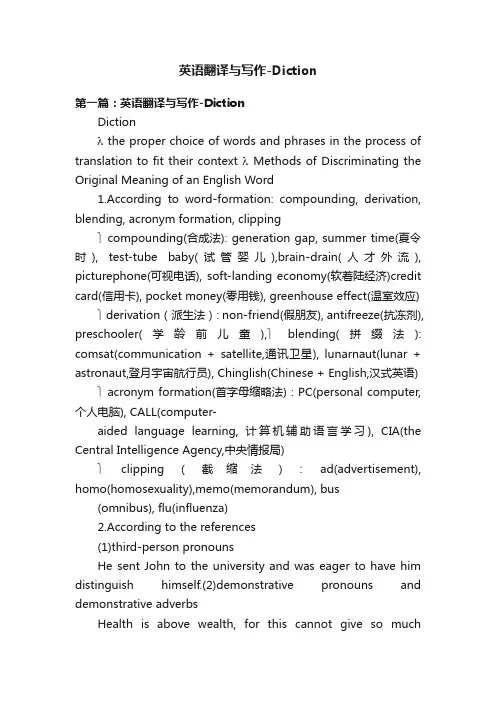
英语翻译与写作-Diction第一篇:英语翻译与写作-DictionDictionλ the proper choice of words and phrases in the process of translation to fit their context λ Methods of Discriminating the Original Meaning of an English Word1.According to word-formation: compounding, derivation, blending, acronym formation, clipping⎫ compounding(合成法): generation gap, summer time(夏令时), test-tube baby(试管婴儿),brain-drain(人才外流), picturephone(可视电话), soft-landing economy(软着陆经济)credit card(信用卡), pocket money(零用钱), greenhouse effect(温室效应) ⎫ derivation(派生法): non-friend(假朋友), antifreeze(抗冻剂), preschooler(学龄前儿童),⎫blending(拼缀法): comsat(communication + satellite,通讯卫星), lunarnaut(lunar + astronaut,登月宇宙航行员), Chinglish(Chinese + English,汉式英语) ⎫ acronym formation(首字母缩略法):PC(personal computer, 个人电脑), CALL(computer-aided language learning, 计算机辅助语言学习), CIA(the Central Intelligence Agency,中央情报局)⎫clipping(截缩法): ad(advertisement), homo(homosexuality),memo(memorandum), bus(omnibus), flu(influenza)2.According to the references(1)third-person pronounsHe sent John to the university and was eager to have him distinguish himself.(2)demonstrative pronouns and demonstrative adverbsHealth is above wealth, for this cannot give so muchhappiness as that.(3)references of comparisonI hate blue shirts;white shirts suit me but gray is the most preferable.3.According to the context and collocation ⎫No context, no translation.e.g.I’ll finish the book next week.Tension is building up.⎫Each word, when used in a new context, is a new word.As luck would have it, no one was in the building when the explosion occurred.As luck would have it, there was rain on the day of the picnic.The war is becoming the most important story of this generation.It is quite another story now.Some reporters who were not included in the session broke the story.What a story!I don’t believe a word of it.The story about him became smaller and by and by faded out from American TV.在这种情况下 under such circumstances / such being the case这种情况必须改变。
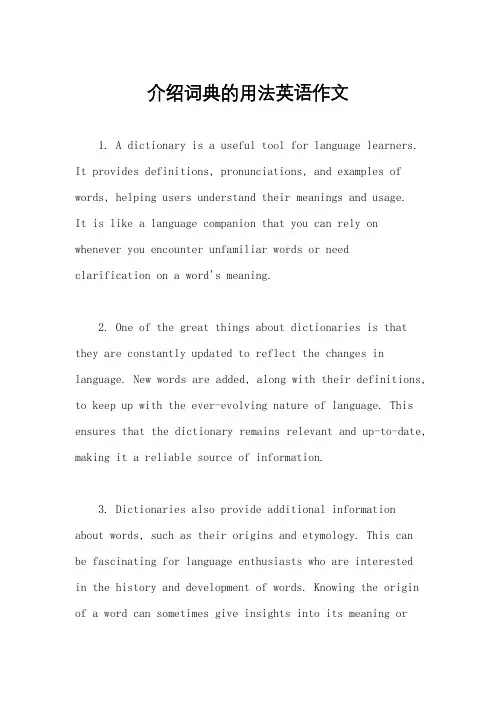
介绍词典的用法英语作文1. A dictionary is a useful tool for language learners. It provides definitions, pronunciations, and examples of words, helping users understand their meanings and usage.It is like a language companion that you can rely on whenever you encounter unfamiliar words or needclarification on a word's meaning.2. One of the great things about dictionaries is that they are constantly updated to reflect the changes in language. New words are added, along with their definitions, to keep up with the ever-evolving nature of language. This ensures that the dictionary remains relevant and up-to-date, making it a reliable source of information.3. Dictionaries also provide additional information about words, such as their origins and etymology. This can be fascinating for language enthusiasts who are interestedin the history and development of words. Knowing the origin of a word can sometimes give insights into its meaning orhelp users remember it better.4. In addition to definitions, dictionaries often include usage notes and examples to help users understand how words are used in different contexts. This is particularly helpful for language learners who want to improve their vocabulary and fluency. By seeing words in context, users can grasp their nuances and gain a deeper understanding of their meanings.5. Dictionaries are not just limited to words; they also provide information on grammar, idioms, and collocations. These additional features can enhance users' language skills and help them communicate more effectively. For example, a dictionary may provide explanations on verb tenses or offer examples of common idiomatic expressions.6. Many dictionaries now come in digital formats, making them easily accessible on smartphones or computers. This convenience allows users to access a wealth of information anytime, anywhere. Digital dictionaries often come with additional features like audio pronunciations andinteractive exercises, making the learning experience even more engaging.7. Finally, dictionaries can be used not only for language learning but also for writing and communication. They can help users find the right words to express their thoughts and ideas accurately. Whether you are writing an essay, a business email, or a creative piece, a dictionary can be a valuable tool to improve your writing skills.In conclusion, dictionaries are indispensable companions for language learners. They provide definitions, examples, and additional information to help users understand words and improve their language skills. With the advancements in technology, dictionaries have become more accessible and interactive, making them even more valuable in today's digital age.。
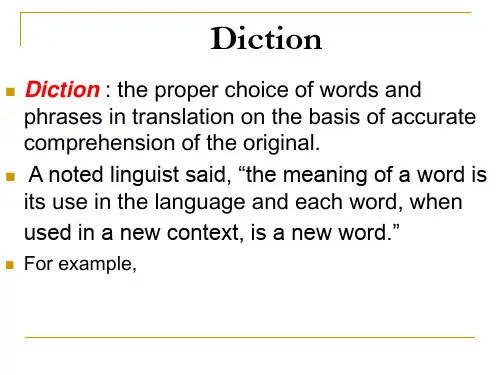
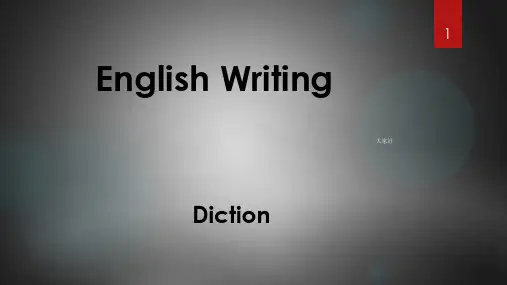

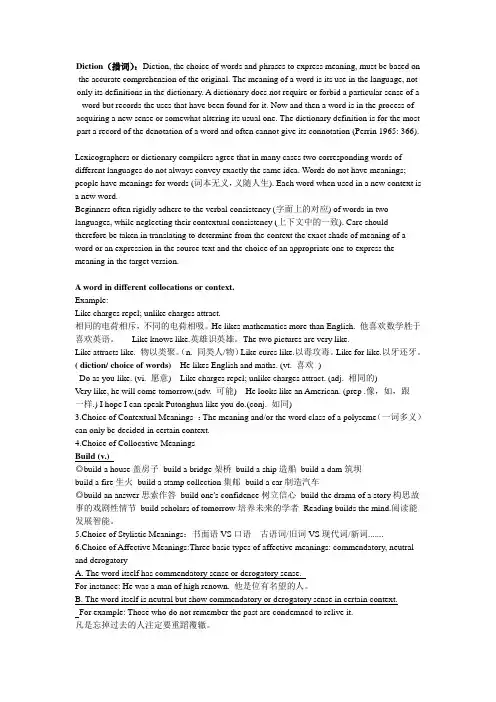
Diction(措词):Diction, the choice of words and phrases to express meaning, must be based on the accurate comprehension of the original. The meaning of a word is its use in the language, not only its definitions in the dictionary. A dictionary does not require or forbid a particular sense of a word but records the uses that have been found for it. Now and then a word is in the process of acquiring a new sense or somewhat altering its usual one. The dictionary definition is for the most part a record of the denotation of a word and often cannot give its connotation (Perrin 1965: 366).Lexicographers or dictionary compilers agree that in many cases two corresponding words of different languages do not always convey exactly the same idea. Words do not have meanings; people have meanings for words (词本无义,义随人生). Each word when used in a new context is a new word.Beginners often rigidly adhere to the verbal consistency (字面上的对应) of words in two languages, while neglecting their contextual consistency (上下文中的一致). Care should therefore be taken in translating to determine from the context the exact shade of meaning of a word or an expression in the source text and the choice of an appropriate one to express the meaning in the target version.A word in different collocations or context.Example:Like charges repel; unlike charges attract.相同的电荷相斥,不同的电荷相吸。
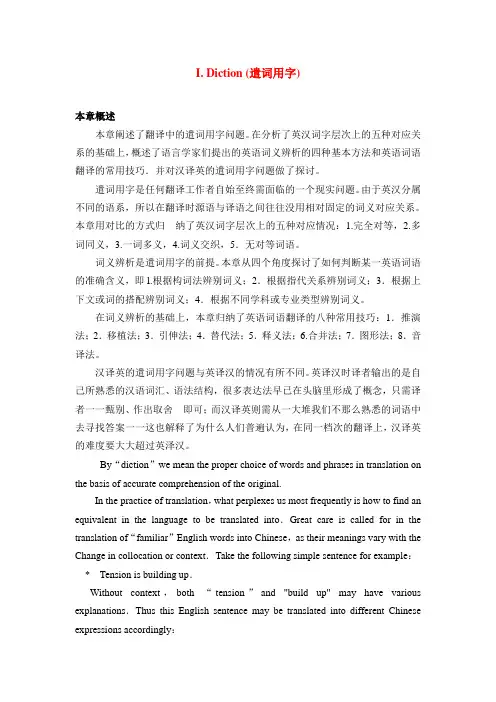
I. Diction (遣词用字)本章概述本章阐述了翻译中的遣词用字问题。
在分析了英汉词字层次上的五种对应关系的基础上,概述了语言学家们提出的英语词义辨析的四种基本方法和英语词语翻译的常用技巧.并对汉译英的遣词用字问题做了探讨。
遣词用字是任何翻译工作者自始至终需面临的一个现实问题。
由于英汉分属不同的语系,所以在翻译时源语与译语之间往往没用相对固定的词义对应关系。
本章用对比的方式归纳了英汉词字层次上的五种对应情况:1.完全对等,2.多词同义,3.一词多义,4.词义交织,5.无对等词语。
词义辨析是遣词用字的前提。
本章从四个角度探讨了如何判断某一英语词语的准确含义,即l.根据构词法辨别词义;2.根据指代关系辨别词义;3.根据上下文或词的搭配辨别词义;4.根据不同学科或专业类型辨别词义。
在词义辨析的基础上,本章归纳了英语词语翻译的八种常用技巧:1.推演法;2.移植法;3.引伸法;4.替代法;5.释义法;6.合并法;7.图形法;8.音译法。
汉译英的遣词用字问题与英译汉的情况有所不同。
英译汉时译者输出的是自己所熟悉的汉语词汇、语法结构,很多表达法早已在头脑里形成了概念,只需译者一一甄别、作出取舍即可;而汉译英则需从一大堆我们不那么熟悉的词语中去寻找答案一一这也解释了为什么人们普遍认为,在同一档次的翻译上,汉译英的难度要大大超过英泽汉。
By“diction”we mean the proper choice of words and phrases in translation on the basis of accurate comprehension of the original.In the practice of translation,what perplexes us most frequently is how to find an equivalent in the language to be translated into.Great care is called for in the translation of“familiar”English words into Chinese,as their meanings vary with the Change in collocation or context.Take the following simple sentence for example:* Tension is building up.Without context,both “tension”and "build up" may have various explanations.Thus this English sentence may be translated into different Chinese expressions accordingly:·形势紧张起来。
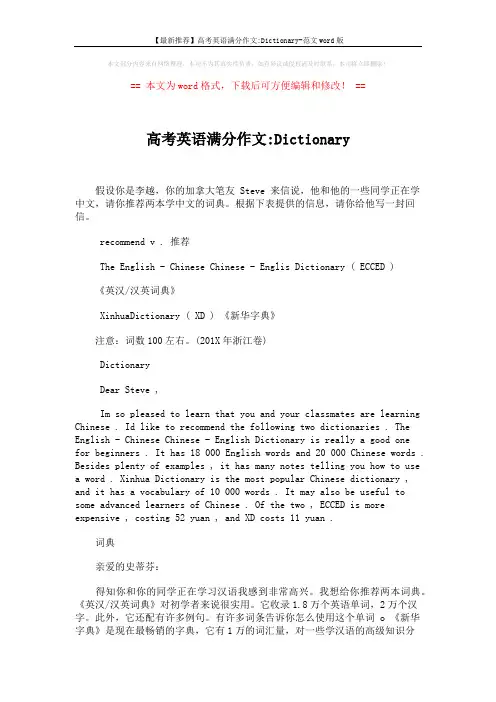
【最新推荐】高考英语满分作文:Dictionary-范文word版本文部分内容来自网络整理,本司不为其真实性负责,如有异议或侵权请及时联系,本司将立即删除!== 本文为word格式,下载后可方便编辑和修改! ==高考英语满分作文:Dictionary假设你是李越,你的加拿大笔友 Steve 来信说,他和他的一些同学正在学中文,请你推荐两本学中文的词典。
根据下表提供的信息,请你给他写一封回信。
recommend v . 推荐The English - Chinese Chinese - Englis Dictionary ( ECCED )《英汉/汉英词典》XinhuaDictionary ( XD ) 《新华字典》注意:词数100左右。
(201X年浙江卷)DictionaryDear Steve ,Im so pleased to learn that you and your classmates are learning Chinese . Id like to recommend the following two dictionaries . The English - Chinese Chinese - English Dictionary is really a good onefor beginners . It has 18 000 English words and 20 000 Chinese words . Besides plenty of examples , it has many notes telling you how to use a word . Xinhua Dictionary is the most popular Chinese dictionary , and it has a vocabulary of 10 000 words . It may also be useful to some advanced learners of Chinese . Of the two , ECCED is more expensive , costing 52 yuan , and XD costs 11 yuan .词典亲爱的史蒂芬:得知你和你的同学正在学习汉语我感到非常高兴。
1.Town and Country Life in EnglandThere is a big difference between town life and country life in England. In the country, everybody knows everybody else. They know what time you get up, what time you go to bed and what you have for dinner. If you want help, you will always get it and you will be glad to help others.In a large town like London, however, it can sometimes happen that you have never seen your next door neighbor and you do not know his name or anything about him. People in London are often very lonely. This is because people go to different places in the evenings and at weekends. If you walk through the streets in the centre of London on Sunday, it is like a town without people. One is sorry for old people living on their own. They could die in their homes and would not be discovered for weeks or even months2.A Change in Women’s LifeThe important change in women’s life-pattern has only recently begun to have its full effect on women’s economic position. Even a few years ago most girls left school at the first opportunity, and most of them took a full-time job. However, when they married, they usually left work at once and never returned to it. Today the school-leaving age is sixteen, manygirls stay at school after that age, and though women tend to marry younger, more married women stay at work at least until shortly before their first child is born. Very many more afterwards return to full-time or part-time work. Such changes have led to a new relationship in marriage, with the husband accepting a greater share of the duties and satisfactions of family life and with both husband and wife sharing more equally in providing the money, and running the home, according to the abilities and interests of each of them.Useful Words and Expressions:1. life-pattern生活方式2. share3.A Popular Pastime of the English PeopleOne of the best means of understanding the people of any nation is watching what the do with their non-working time.Most English men, women and children love growing things, especially flowers. Visitors to England in spring, summer or autumn are likely to see gardens all they way along the railway lines. There are flowers at the airports and flowers in factory grounds, as well as in gardens along the roads. Each English town has at least one park with beautifully kept flower beds. Public buildings of every kind have brilliant window boxes andsometimes baskets of flowers are hanging on them.But what the English enjoy most is growing things themselves. If it is impossible to have a garden, then a window box or something growing in a pot will do. Looking at each other’s gardens is a popular pastime with the English.Useful Words and Expressions:1. window box:窗台上的花盆箱2.pastime 消遣,娱乐Swimming is my favorite pastime.4.British and American Police OfficersReal policemen, both in Britain and the U.S., hardly recognize any common points between their lives and what they se on TV—if they ever get home in time.Some things are almost the same, of course, but the policemen do not think much of them much of them.The first difference is that a policeman’s real life deals with the law. Most of what he learns is the law. He has to know actually what actions are against the law and what facts can be used to prove them in court. He has to know nearly as much law as a lawyer, and what’s more, he has to put it into practice on his feet, in the dark and, running down a narrow street after someone hewants to talk to.Little of his time is spent in talking with beautiful girls or in bravely facing cruel criminals. He will spend most of his working life arranging millions of words on thousands of forms about hundreds of sad, ordinary people who are guilty--- or not of stupid, unimportant crimes.Useful Words and Expressions:1. think much of 重视,尊重2. in court 在法庭上3. criminal 罪犯,犯罪者4. guilty 犯罪的,有罪的5.Living SpaceHow much living space does a person need? What happens when his space needs are not met? Scientists are doing experiments on rats to try to determine the effects of overcrowded conditions on man. Recent studies have shown that the behavior of rats is greatly affected by space. If rats have enough living space, they eat well, sleep well and produce their young well. But if their living conditions become too crowded, their behavior and even their health change obviously. They can not sleep and eat well, and signs of fear and worry become clear. The more crowded they are, and more they tend to bite eachother and even kill each other. Thus, for rats, populations and violence are directly related. Is this a natural law for human society as well? Is enough space not only satisfactory, but necessary for human survival? These are interesting questions.6.The United NationsIn 1945, representatives of 50 nations met to plan this organization. It was called the United Nations. After the war, many more nations joined.There are two major parts of the United Nations. One is called the General Assembly. In the General Assembly, every member nation is represented and has an equal vote.The second part is called the Security Council. It has representatives of just 15 nations. Five nations are permanent members: the United States, Russia, France, Britain, and China. The 10 other members are elected every two years by the General Assembly.The major job of the Security Council is to keep peace in the world. If necessary, it can send troops from member nations to try to stop little wars before they turn into big ones.It is hard to get the nations of the Security Council to agree on when this is necessary. But they did vote to try to stop wars.Useful Words and Expressions:1. representative 代表2. General Assembly 联合国大会3. permanent 永久的,持久的4. Security Council 联合国安全理事会7.PlasticWe use plastic wrap to protect our foods. We put our garbage in plastic bags or plastic cans. We sit on plastic chairs, play with plastic toys, drink from plastic cups, and wash our hair with shampoo from plastic bottles!Plastic does not grow in nature. It is made by mixing certain things together. We call it a produced or manufactured material. Plastic was first made in the 1860s from plants, such as wood and cotton. That plastic was soft and burned easily.The first modern plastics were made in the 1930s. Most clear plastic starts out as thick, black oil. That plastic coating inside a pan begins as natural gas.Over the years, hundreds of different plastics have been developed. Some are hard and strong. Some are soft and bendable. Some are clear. Some are many-colored. There is a plastic for almost every need. Scientists continue to experiment with plastics. They hope to find even ways to use them!8. Display of GoodsAre supermarkets designed to persuade us to buy more?Fresh fruit and vegetables are displayed near supermarket entrances. This gives the impression that only healthy food is sold in the shop. Basic foods that everyone buys, like sugar and tea, are not put near each other. They are kept in different aisles so customers are taken past other attractive foods before they find what they want. In this way, shoppers are encouraged to buy products that they do not really need.Sweets are often placed at children’s eye level at the checkout. While parents are waiting to pay, children reach for the sweets and put them in the trolley.More is bought from a fifteen-foot display of one type of product than from a ten-foot one. Customers also buy more when shelves are full than when they are half empty. They do not like to buy from shelves with few products on them because they feel there is something wrong with those products that are there.Useful Words and Expressions:1. aisle 走廊,过道2. trolley 手推车3. checkout 收款台9.Albert EinsteinAlbert Einstein was born in Germany in 1879, His father owned a factory that made electrical devices. His mother enjoyed music and books. His parents were Jewish but they did not observe many of the re ligion’s rules. Albert was a quite child who spent much of his time alone. He was slow to talk and had difficulty learning to read. When Albert was five years old, his father gave him a compass. The child was filled with wonder when he discovered that the compass needle always pointed in the same direction—to be north. He asked his father and his uncle what caused the needle to move. Their answers about magnetism and gravity were difficult for the boy to understand. Yet he spent a lot of time thinking about them. He said later that he felt something hidden had to be behind things.Useful expressions and words:1. device 装置,设备leave to one’s own devices 听任某人自行其是,允许某人按自己的意愿做事She left the child to her own devices for an hour in the afternoon.她允许孩子在下午有一个小时的自由支配时间。
大学英语diction范文English DictionariesMost English dictionaries will tell you a number of things about the language.There are three important things,spelling,pronunciation and meanings.The first is the spelling of the words.If you are not sure about the spelling of a word,you can try to find the correct spelling in a dictionary.The words are always given in alphabetical order.The second thing is pronunciation,Most dictionaries give the pronunciation of a word in a special kind of alphabet,which is called phonetic.The third thing a dictionary will tell you is the meanings of words,Many words have more than one meaning,and a good dictionary will explain all of the word's meanings.These are some of the important facts that you can learn from dictionaries.The dictionary is living teacher.Whenever you come across a new word,just consult it and you will get a clear definition from it.Every student,no matter attending school or self-taught,should always have a dictionary at hand.As a study aid,it is convenient,inexpensive andall knowing.My English teacher(in high school)is Miss Huang.She is a beautiful lady.There is always a smile on her face.Miss Huang likessinging.She is good at playing the piano.In the evening,she always sits in front of the piano and plays nice music.She is a gooddancer,too.Sometimes she teaches us dancing.Miss Huang likes dogs very much because the dog is very friendly and cute.Her favorite color is blue,because blue is the color of the sky and the sea.She is my favorite teacher.Our classmates all like her very much.My Teacher in High SchoolMy English teacher in high school is Miss Huang,who is a beautiful lady.Her favorite color is blue because blue is the color of the sky and the sea.Whenever you meet her,there is always a smile on her face.We all regarded Miss Huang as a responsible teacher.She always prepared her lectures seriously,so her lectures were both interesting and instructive.She corrected our homework carefully and wrote some remarks if we made some mistakes.When we made a little progress,she was as happy as we were.Miss Huang is our good teacher as well as a helpful friend.Both my classmates and I like her very much.y English teacher in high school is Mr.Li,who is an ordinary-looking,grey-haired man wearing a pair of glasses.At that time,he was about fifty and looked rather thin.One day,after the middle-term English test,we began to complain in our dormitory.He was too strict with us,we thought.On that day,he seemed very disappointed and announced the names of the students who had failed in the test.Most of them felt humiliated and depressed.But my opinion of Mr.Li soon changed.One morning we werehaving our morning class as usual.In the course of class,I learned that my teacher had left for school at five o’clock.Because of the traffic accident(a freight train turned over the previous day),he had to walk to school for more than an hour.At five o’clock!Dear me!I was still in my dream then!I was deeply moved,so were some otherclassmates.Gradually we came to see that our English teacher loved us dearly though he never spoke it out.He always corrected our exercises carefully and seriously.Whenever we made some progress,we could find that he was as happy as we were.Mr.Li is a responsible and qualified teacher with profound knowledge.Though he doesn’t teach me now,I will always keep him in mind.。
Diction●the proper choice of words and phrases in the process of translation to fit their context●Methods of Discriminating the Original Meaning of an English Word1.According to word-formation: compounding, derivation, blending, acronym formation, clipping✓compounding(合成法): generation gap, summer time (夏令时), test-tube baby (试管婴儿), brain-drain (人才外流), picturephone (可视电话), soft-landing economy(软着陆经济)credit card (信用卡), pocket money(零用钱), greenhouse effect (温室效应)✓derivation(派生法): non - friend (假朋友), antifreeze (抗冻剂), preschooler (学龄前儿童) , ✓blending (拼缀法): comsat ( communication + satellite,通讯卫星) , lunarnaut ( lunar + astronaut,登月宇宙航行员) , Chinglish (Chinese + English,汉式英语)✓acronym formation(首字母缩略法):PC ( personal computer, 个人电脑) , CALL ( computer - aided language learning, 计算机辅助语言学习) , CIA ( the Central Intelligence Agency,中央情报局)✓clipping(截缩法): ad ( advertisement) , homo ( homosexuality) ,memo (memorandum) , bus ( omnibus) , flu ( influenza)2.According to the references(1)third-person pronounsHe sent John to the university and was eager to have him distinguish himself.(2)demonstrative pronouns and demonstrative adverbsHealth is above wealth, for this cannot give so much happiness as that.(3)references of comparisonI hate blue shirts; white shirts suit me but gray is the most preferable.3.According to the context and collocation✓No context, no translation. e.g.I’ll finish the book next week.Tension is building up.✓Each word, when used in a new context, is a new word.As luck would have it, no one was in the building when the explosion occurred.As luck would have it, there was rain on the day of the picnic.The war is becoming the most important story of this generation.It is quite another story now.Some reporters who were not included in the session broke the story.What a story! I don’t believe a word of it.The story about him became smaller and by and by faded out from American TV.在这种情况下under such circumstances / such being the case这种情况必须改变。
This state of affairs must change.现在情况不同了。
Now things are different.他们的情况怎么样?How do matters stand with them?前线有什么情况?How is the situation at the front?我们可能去那儿,那得看情况而定。
We may go there, but that depends.4.According to different branches of learning and specialtiesbase: 词根(lexicology)本金(business)底涂(painting)基线(survey)根据地(military science)底座(machinery)底边(maths)The lathe should be set on a firm base.Line AB is the base of the triangle ABC.The weary troops marched back to the base.Techniques of Translating a Given Word1.Deduction:to deduce the original meaning in the light of the explanation of a dictionarycybercafé– a coffee house that provides patrons with computer terminals for browsing the Internet fora fee 网吧smart card– electronic card: a small plastic card containing a microchip that can store personal data and bank-account details 智能卡win-win– beneficial to all in some way 双赢上班上报上台上场上冻上告上当2.Transplant: to translate the ingredients of a given English word literally and then combine each part ofthemblue tooth microwave white-collar supermarket春节中秋节泼水节火把节3.Extension: the extension of meaning is from the concrete to the abstract, and vice versa.1)from the concrete to the abstractlick sb’s boots巴结eat one’s heart out极度悲痛catch forty winks打盹儿eat like a bird吃得极少谦虚态度modesty 发展过程development 无知的表现innocence 鸡毛蒜皮trifling 同情心理sympathyI was practically on my knees but he still refused.The matter was finally settled under the table.He earns scarcely enough to keep body and soul together.I have no head for music.这是他们夫妻之间的事,你去插一脚干吗?这消息让我出了一身冷汗。
他毛遂自荐来这所小学当老师。
真正的好朋有应该是雪中送炭。
这些问题盘根错节,三言两语说不清楚。
2)from the abstract to the concretetransportation运输工具keep quiet噤若寒蝉be full of anxiety and worry牵肠挂肚very anxious to return home归心似箭have not cut off relations completely藕断丝连有花不完的钱have enough money to burn 结为良缘win the hand of 鲁莽的人a bull in a china shop 家丑a skeleton in the cupboard 保密keep sth under one’s hatAll the people were exasperated by his fault-finding.More and more people have realized the necessity of learning computer.His arrogance sent him into isolation and helplessness.Her jealousy is the cause of her failure.There has been too much violence in that region.他每天要处理许多棘手的问题。
这个男孩真粗心,他的书本都已经折角了。
我不想依靠父母过日子。
同反复无常的人没法相处。
4.Substitution:to replace the words of the original expression with Chinese synonyms or idiomsaccording to different situations.5.Explanation:togetherness (家庭或社会的)和睦相处red-shirt红色运动员(出色的美国大学生运动员)clock-watcher老是看钟等下班的人叶公好龙Lord Sheh’s love of dragons (Lord Sheh was so fond of dragons that he adorned his whole palace with drawings and carvings of them. But when a real dragon heard of hisinfatuation and paid him a visit, he was frightened out of his wits.)裹足bound feet ( a vile feudal practice which crippled woman both physically and spiritually)bination:His father is a man who forgives and forgets.We must reach our goals and aims.In our workshop there is a hard and fast rule against smoking.他决心洗心革面,脱胎换骨。